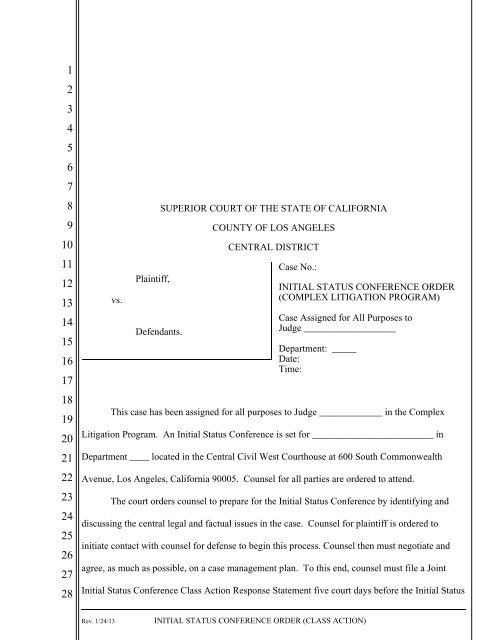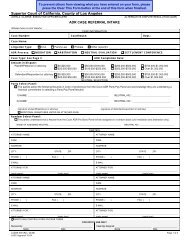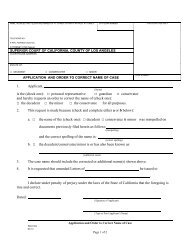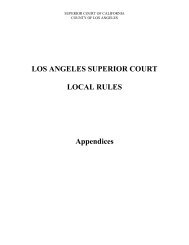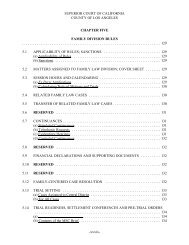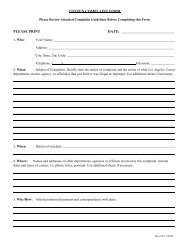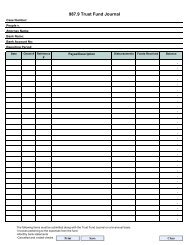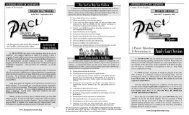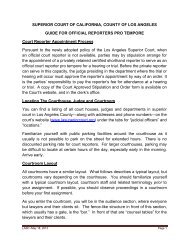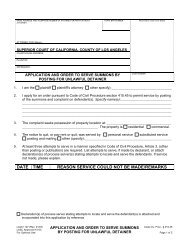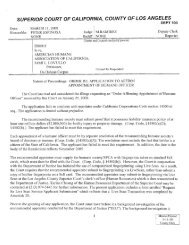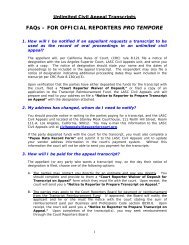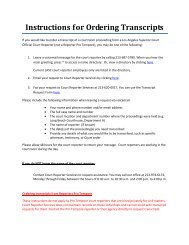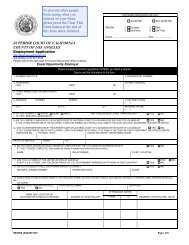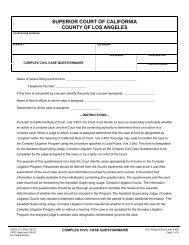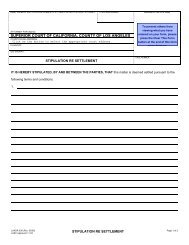Initial Status Conference Order - Superior Court of California ...
Initial Status Conference Order - Superior Court of California ...
Initial Status Conference Order - Superior Court of California ...
You also want an ePaper? Increase the reach of your titles
YUMPU automatically turns print PDFs into web optimized ePapers that Google loves.
1<br />
<br />
<br />
<br />
<br />
<br />
<br />
<br />
<br />
<br />
<br />
<br />
<br />
<br />
<br />
<br />
<br />
<br />
<br />
<br />
<br />
<br />
<br />
<br />
<br />
<br />
<br />
<br />
vs.<br />
Plaintiff,<br />
Defendants.<br />
SUPERIOR COURT OF THE STATE OF CALIFORNIA<br />
COUNTY OF LOS ANGELES<br />
CENTRAL DISTRICT<br />
Case No.:<br />
INITIAL STATUS CONFERENCE ORDER<br />
(COMPLEX LITIGATION PROGRAM)<br />
Case Assigned for All Purposes to<br />
Judge ___________________<br />
Department: _____<br />
Date:<br />
Time:<br />
This case has been assigned for all purposes to Judge _____________ in the Complex<br />
Litigation Program. An <strong>Initial</strong> <strong>Status</strong> <strong>Conference</strong> is set for _________________________ in<br />
Department ____ located in the Central Civil West <strong>Court</strong>house at 600 South Commonwealth<br />
Avenue, Los Angeles, <strong>California</strong> 90005. Counsel for all parties are ordered to attend.<br />
The court orders counsel to prepare for the <strong>Initial</strong> <strong>Status</strong> <strong>Conference</strong> by identifying and<br />
discussing the central legal and factual issues in the case. Counsel for plaintiff is ordered to<br />
initiate contact with counsel for defense to begin this process. Counsel then must negotiate and<br />
agree, as much as possible, on a case management plan. To this end, counsel must file a Joint<br />
<strong>Initial</strong> <strong>Status</strong> <strong>Conference</strong> Class Action Response Statement five court days before the <strong>Initial</strong> <strong>Status</strong><br />
Rev. 1/24/13<br />
INITIAL STATUS CONFERENCE ORDER (CLASS ACTION)
1<br />
2<br />
3<br />
4<br />
5<br />
6<br />
7<br />
8<br />
9<br />
10<br />
11<br />
12<br />
13<br />
14<br />
15<br />
16<br />
17<br />
18<br />
19<br />
20<br />
21<br />
22<br />
23<br />
24<br />
25<br />
26<br />
27<br />
28<br />
<strong>Conference</strong>. The Joint Response Statement must be filed on line-numbered pleading paper and<br />
must specifically answer each <strong>of</strong> the below-numbered questions. Do not use the use the Judicial<br />
Council Form CM-110 (Case Management Statement).<br />
1. PARTIES AND COUNSEL: Please list all presently-named class representatives and<br />
presently-named defendants, together with all counsel <strong>of</strong> record, including counsel’s contact and<br />
email information.<br />
2. POTENTIAL ADDITIONAL PARTIES: Indicate whether any plaintiff presently<br />
intends to add additional class representatives, and, if so, the name(s) and date by which these<br />
class representatives will be added. Indicate whether any plaintiff presently intends to name<br />
additional defendants, and, if so, the name(s) and date by which the defendant(s) will be added.<br />
Indicate whether any appearing defendant presently intends to file a cross-complaint and, if so, the<br />
names <strong>of</strong> cross-defendants and the date by which the cross-complaint will be filed.<br />
3. IMPROPERLY NAMED DEFENDANT(S): If the complaint names the wrong<br />
person or entity, please explain why the named defendant is improperly named and the proposed<br />
procedure to correct this error.<br />
4. ADEQUACY OF PROPOSED CLASS REPRESENTATIVE(S): If any party<br />
believes one or more named plaintiffs might not be an adequate class representative, including<br />
reasons <strong>of</strong> conflict <strong>of</strong> interest as described in Apple Computer v. The <strong>Superior</strong> <strong>Court</strong> <strong>of</strong> Los<br />
Angeles County (2005) 126 Cal.App.4 th 1253, please explain. No prejudice will attach to these<br />
responses.<br />
5. ESTIMATED CLASS SIZE: Please discuss and indicate the estimated class size.<br />
6. OTHER ACTIONS WITH OVERLAPPING CLASS DEFINITIONS: Please list<br />
other cases with overlapping class definitions. Please identify the court, the short caption title, the<br />
docket number, and the case status.<br />
-2-<br />
Rev. 1/24/13<br />
INITIAL STATUS CONFERENCE ORDER (CLASS ACTION)
1<br />
2<br />
3<br />
4<br />
5<br />
6<br />
7<br />
8<br />
9<br />
10<br />
11<br />
12<br />
13<br />
14<br />
15<br />
16<br />
17<br />
18<br />
19<br />
20<br />
21<br />
22<br />
23<br />
24<br />
25<br />
26<br />
27<br />
28<br />
7. POTENTIALLY RELEVANT ARBITRATION AND/OR CLASS ACTION<br />
WAIVER CLAUSES: Please state whether arbitration is an issue in this case and attach a<br />
sample <strong>of</strong> any relevant clause <strong>of</strong> this sort. Opposing parties must summarize their views on this<br />
issue.<br />
8. POTENTIAL EARLY CRUCIAL MOTIONS: Opposing counsel should identify<br />
and describe the significant core issues in the case, and then identify efficient ways to resolve<br />
those issues, including one or more <strong>of</strong> the following:<br />
• Motion to Compel Arbitration,<br />
• Early motions in limine,<br />
• Early motions about particular jury instructions and verdict forms,<br />
• Demurrers,<br />
• Motions to strike,<br />
• Motions for judgment on the pleadings, and<br />
• Motions for summary judgment and summary adjudication.<br />
NOTE: Effective 2012, by stipulation a party may move for summary adjudication <strong>of</strong><br />
a legal issue or a claim for damages that does not completely dispose <strong>of</strong> a cause <strong>of</strong> action, an<br />
affirmative defense, or an issue <strong>of</strong> duty 1 . Counsel are to analyze, discuss, and report on the<br />
relevance <strong>of</strong> this powerful new procedure.<br />
9. CLASS CONTACT INFORMATION: Counsel should discuss whether obtaining<br />
class contact information from defendant’ s records is necessary in this case and, if so, whether<br />
the parties consent to an “opt-out” notice process (as approved in Belaire-West Landscape, Inc. v.<br />
<strong>Superior</strong> <strong>Court</strong> (2007) 149 Cal.App.4 th 554, 561). Counsel should address timing and procedure,<br />
1 See Code Civ. Proc. § 437c, subd. (s)<br />
-3-<br />
Rev. 1/24/13<br />
INITIAL STATUS CONFERENCE ORDER (CLASS ACTION)
1<br />
2<br />
3<br />
4<br />
5<br />
6<br />
7<br />
8<br />
9<br />
10<br />
11<br />
12<br />
13<br />
14<br />
15<br />
16<br />
17<br />
18<br />
19<br />
20<br />
21<br />
22<br />
23<br />
24<br />
25<br />
26<br />
27<br />
28<br />
including allocation <strong>of</strong> cost and the necessity <strong>of</strong> a third party administrator.<br />
10. PROTECTIVE ORDERS: Parties considering an order to protect confidential<br />
information from general disclosure should begin with the model protective orders found on the<br />
Los Angeles <strong>Superior</strong> <strong>Court</strong> Website under “Civil Tools for Litigators.”<br />
11. DISCOVERY: Please discuss a discovery plan. If the parties cannot agree on a plan,<br />
summarize each side’s views on discovery. The court generally allows discovery on matters<br />
relevant to class certification, which (depending on circumstances) may include factual issues also<br />
touching the merits. The court generally does not permit extensive or expensive discovery<br />
relevant only to the merits (for example, detailed damages discovery) at the initial stage unless a<br />
persuasive showing establishes early need. If any party seeks discovery from absent class<br />
members, please estimate how many, and also state the kind <strong>of</strong> discovery you propose 2 .<br />
12. INSURANCE COVERAGE: Please state if (1) there is insurance for indemnity or<br />
reimbursement, and (2) whether there are any insurance coverage issues which might affect<br />
settlement.<br />
13. ALTERNATIVE DISPUTE RESOLUTION: Please discuss ADR and state each<br />
party’s position about it. If pertinent, how can the court help identify the correct neutral and<br />
prepare the case for a successful settlement negotiation?<br />
14. TIMELINE FOR CASE MANAGEMENT: Please recommend dates and times for<br />
the following:<br />
• The next status conference,<br />
• A schedule for alternative dispute resolution, if it is relevant,<br />
• A filing deadline for the motion for class certification, and<br />
2 See <strong>California</strong> Rule <strong>of</strong> <strong>Court</strong>, Rule 3.768.<br />
-4-<br />
Rev. 1/24/13<br />
INITIAL STATUS CONFERENCE ORDER (CLASS ACTION)
1<br />
2<br />
3<br />
4<br />
5<br />
6<br />
7<br />
8<br />
9<br />
10<br />
11<br />
12<br />
13<br />
14<br />
15<br />
16<br />
17<br />
18<br />
19<br />
20<br />
21<br />
22<br />
23<br />
24<br />
25<br />
26<br />
27<br />
28<br />
• Filing deadlines and descriptions for other anticipated non-discovery motions.<br />
15. ELECTRONIC SERVICE OF PAPERS: For efficiency the complex program<br />
requires the parties in every new case to use a third-party cloud service, such as:<br />
• Case Anywhere (www.caseanywhere.com),<br />
• CaseHomePage (www.casehomepage.com), or<br />
• File & Serve Express (www.lexisnexis.com/fileandserve).<br />
Please agree on one and submit the parties’ choice when filing the Joint <strong>Initial</strong> <strong>Status</strong><br />
<strong>Conference</strong> Class Action Response Statement. If there is agreement, please identify the vendor. If<br />
parties cannot agree, the court will select the vendor at the <strong>Initial</strong> <strong>Status</strong> <strong>Conference</strong>. Electronic<br />
service is not the same as electronic filing. Only traditional methods <strong>of</strong> filing by physical delivery<br />
<strong>of</strong> original papers or by fax filing are presently acceptable.<br />
Reminder When Seeking To Dismiss Or To Obtain Settlement Approval:<br />
“A dismissal <strong>of</strong> an entire class action, or <strong>of</strong> any party or cause <strong>of</strong> action in a class action, requires<br />
court approval. . . . Requests for dismissal must be accompanied by a declaration setting forth the<br />
facts on which the party relies. The declaration must clearly state whether consideration, direct or<br />
indirect, is being given for the dismissal and must describe the consideration in detail.” 3 If the<br />
parties have settled the class action, that too will require judicial approval based on a noticed<br />
motion (although it may be possible to shorten time by consent for good cause shown).<br />
Reminder When Seeking Approval <strong>of</strong> a Settlement– Plaintiff(s) must address the issue<br />
<strong>of</strong> any fee splitting agreement in their motion for preliminary approval and demonstrate<br />
compliance with <strong>California</strong> Rule <strong>of</strong> <strong>Court</strong> 3.769, and the Rules <strong>of</strong> Pr<strong>of</strong>essional Conduct 2-200(a)<br />
as required by Mark v. Spencer (2008) 166 Cal.App. 4 th 219.<br />
3 <strong>California</strong> Rule <strong>of</strong> <strong>Court</strong>, Rule 3.770(a)<br />
-5-<br />
Rev. 1/24/13<br />
INITIAL STATUS CONFERENCE ORDER (CLASS ACTION)
1<br />
2<br />
3<br />
4<br />
5<br />
6<br />
7<br />
8<br />
9<br />
10<br />
11<br />
12<br />
13<br />
14<br />
15<br />
16<br />
17<br />
18<br />
19<br />
20<br />
21<br />
22<br />
23<br />
24<br />
25<br />
26<br />
27<br />
28<br />
Rev. 1/24/13<br />
Pending further order <strong>of</strong> this <strong>Court</strong>, and except as otherwise provided in this <strong>Initial</strong> <strong>Status</strong><br />
<strong>Conference</strong> <strong>Order</strong>, these proceedings are stayed in their entirety. This stay precludes the filing <strong>of</strong><br />
any answer, demurrer, motion to strike, or motions challenging the jurisdiction <strong>of</strong> the <strong>Court</strong>;<br />
however, any defendant may file a Notice <strong>of</strong> Appearance for purposes <strong>of</strong> identification <strong>of</strong> counsel<br />
and preparation <strong>of</strong> a service list. The filing <strong>of</strong> such a Notice <strong>of</strong> Appearance is without prejudice to<br />
any challenge to the jurisdiction <strong>of</strong> the <strong>Court</strong>, substantive or procedural challenges to the<br />
Complaint, without prejudice to any affirmative defense, and without prejudice to the filing <strong>of</strong> any<br />
cross-complaint in this action. This stay is issued to assist the <strong>Court</strong> and the parties in managing<br />
this “complex” case through the development <strong>of</strong> an orderly schedule for briefing and hearings on<br />
procedural and substantive challenges to the complaint and other issues that may assist in the<br />
orderly management <strong>of</strong> these cases. This stay does not preclude the parties from informally<br />
exchanging documents that may assist in their initial evaluation <strong>of</strong> the issues presented in this<br />
case, however it stays all outstanding discovery requests.<br />
Plaintiff’s counsel is directed to serve a copy <strong>of</strong> this <strong>Initial</strong> <strong>Status</strong> <strong>Conference</strong> <strong>Order</strong> along<br />
with a copy <strong>of</strong> the attached Guidelines for Motions for Preliminary and Final Approval <strong>of</strong> Class<br />
Settlement on counsel for all parties, or if counsel has not been identified, on all parties, within<br />
five (5) days <strong>of</strong> service <strong>of</strong> this order. If any defendant has not been served in this action, service is<br />
to be completed within twenty (20) days <strong>of</strong> the date <strong>of</strong> this order.<br />
If all parties have been served, have conducted the required meet and confer, and are ready<br />
to fully participate in the status conference prior to the assigned date, counsel may contact the<br />
clerk <strong>of</strong> Dept 308 and request an earlier date for the <strong>Initial</strong> <strong>Status</strong> <strong>Conference</strong>.<br />
Dated:<br />
____________________________________<br />
Judge _______________<br />
-6-<br />
INITIAL STATUS CONFERENCE ORDER (CLASS ACTION)


